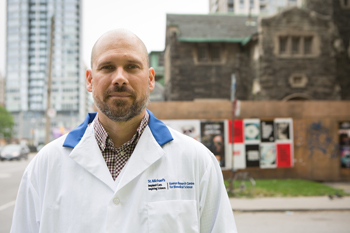Stemming opioid deaths

By Geoff Koehler
- Opioid Crisis Symposium at St. Michael’s Hospital on Nov. 7 at 2 p.m. – Dr. Gaspard Montandon will explain what biomedical research is doing to fight the opioid epidemic.

Dr. Gaspard Montandon, a scientist in the Keenan Research Centre for Biomedical Science, says that to reduce opioid overdose deaths, Canadians need to move from reacting to them to preventing them at a cellular level. (Photo by Katie Cooper)
A new researcher with St. Michael’s Keenan Research Centre for Biomedical Science wants to stop the nearly 2,500 opioid-related deaths in Canada every year by making the drugs less deadly.
“Opioid overdose kills by shutting down the brain and the respiratory system, but nobody knows exactly how that happens at a cellular level,” said Dr. Gaspard Montandon, who has a PhD focused on the impact of drugs on breathing. “With a better understanding of what’s going on in the brain during an overdose, I think we may be able to find an antidote that prevents the lethal side-effects of opioids while preserving their painkiller effects.”
Dr. Montandon said that naloxone—the life-saving drug given to people who are having an opioid overdose—is an effective therapy that should be widely available and used, however, it’s not able to prevent opioid overdose. It can be given only after an overdose has happened.
His search for an antidote to opioid overdose has led Dr. Montandon to identify proteins in the brain that may be potential therapeutic targets. By collaborating with several researchers at the hospital, including Dr. Xiao-Yan Wen of the Zebrafish Centre for Advanced Drug Discovery, Dr. Montandon is building a platform to identify the genes responsible for people’s life-threatening response to opioids. He plans to test an array of drugs in the lab that could prevent the respiratory depression that shuts down the brain and breathing in overdoses.
Related research Dr. Tara Gomes, a scientist with St. Michael’s Ontario Drug Policy Research Network, recently published research showing the scale of the opioid epidemic in Ontario. She showed that two people die each day in Ontario due to opioid overdoses. |
“If we discover the genes responsible for causing respiratory depression when met with opioids, we’ll have great insights into which proteins play a role in making opioid overdose deadly,” said Dr. Montandon. “We could then make opioid therapy safer by developing drugs that change the way our brain’s breathing circuitry responds to opioids and hopefully prevent these drugs from shutting down the brain and breathing.”
Over the last 25 years, deaths related to opioid prescriptions in Ontario have nearly quadrupled. Dr. Montandon said his quest is to dramatically reduce that trend.
About St. Michael’s Hospital
St. Michael’s Hospital provides compassionate care to all who enter its doors. The hospital also provides outstanding medical education to future health care professionals in more than 29 academic disciplines. Critical care and trauma, heart disease, neurosurgery, diabetes, cancer care, care of the homeless and global health are among the Hospital’s recognized areas of expertise. Through the Keenan Research Centre and the Li Ka Shing International Healthcare Education Centre, which make up the Li Ka Shing Knowledge Institute, research and education at St. Michael’s Hospital are recognized and make an impact around the world. Founded in 1892, the hospital is fully affiliated with the University of Toronto.
